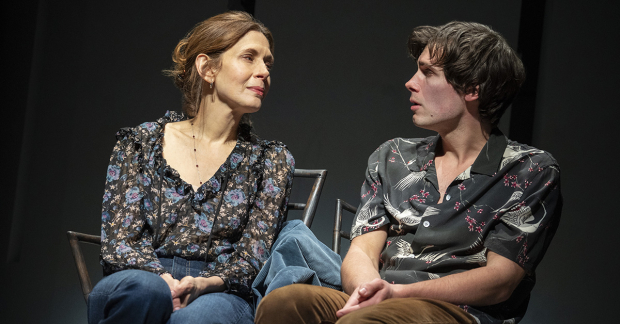Review: Letters From Max Is Sarah Ruhl's Grief-Stricken Farewell to a Young Friend
In her new play, Ruhl documents her relationship with student Max Ritvo, who died of cancer at 25.

(© Joan Marcus)
By all accounts, poet Max Ritvo was one of a kind. His mentor, 2020 Nobel Prize winner Louise Glück, said, "Max Ritvo sounds like no one else — this is the rarest of all possible gifts." Said writer Lucie Brock-Broido, "Max was generous, often brilliant." Poet Dorothea Laskey referred to him as "a truly charismatic soulmate." With descriptors like that, it is no wonder so many people would want to carry Ritvo's torch forward.
Sarah Ruhl's latest work — Letters from Max, a ritual at Signature Theatre Company — is less a play than it is a luminous public display of mourning for Ritvo, her student and friend who died of cancer in 2016 at the age of 25. Inspired by Ruhl and Ritvo's posthumously published collection of correspondences, the production — sensitively directed by Kate Whoriskey, and lovingly acted by Jessica Hecht (as Sarah) and Zane Pais and Ben Edelman (who alternate the role of Max) — is a straightforward adaptation, with much of the spoken language coming directly from Ruhl and Ritvo's notes. It is amazing how effortlessly these missives manage to capture their divergent personalities, and how the performers manage to tap into something almost ethereal in their delivery.
When they first meet, 20-year-old Max is applying to be in Sarah's playwriting class at Yale. Discovering that Max is a poet with a sense of humor — her favorite kind of poet, she says — Sarah lets him in the class. The two become close almost immediately, bonding over her jealousy that he had the foresight to book tickets to the 2012 revival of Robert Wilson and Philip Glass's Einstein on the Beach at BAM.
As their teacher-student-friend relationship blossoms, Sarah learns that Max is a survivor of Ewing's sarcoma, a pediatric cancer first diagnosed when Max was 16. Though he spent the subsequent years with no evidence of disease, the cancer reoccurs shortly into Max's senior year and takes over his body. He and Sarah spend the remaining five years of his life exchanging notes about philosophy, art, religion, the afterlife, and, perhaps most importantly, the joys of soup.
The epistolary nature of the play creates somewhat of an artificial distance for us, the spectators. The strength that this man showed in the face of a most grueling and prolonged death sentence is undeniably moving, and the ending is irrefutably devastating. But in Ruhl's determination to not make this a sad play but a life-affirming one, emotion and catharsis are kept at arm's length. It's almost as if she was afraid to truly dramatize the grief she experienced (and is still experiencing), and therefore is frightened of going for our collective jugulars. I was looking forward to a good cry, and I didn't get it.
Still, there's a beautiful honesty to the whole thing, especially the performances. Hecht uncannily captures Ruhl's high-pitched vocal timbre and puts herself through the wringer as she watches a person she cares for so much go through hell. Pais fills Max with youthful exuberance, charisma, and bravery (he and Edelman split a third role — that of an angelic helpmate — when they are not playing Max). Together, they capture the uniqueness of their respective figures: Ritvo's effervescence in the face of unconscionable hardship, and the Midwestern demureness of Ruhl, who doesn't always know what to say, but manages to figure it out.
Few contemporary playwrights utilize poetic language with the relish that Ruhl does, and Ritvo, it seems, was her match. The 110-minute drama (which includes a completely unnecessary intermission) is imbued with poetry — spoken by the actors into microphones, projected by S Katy Tucker onto Marsha Ginsburg's cyclorama of a set — and you really do get the sense that Ritvo was an extraordinary thinker. In creating this grief-stricken send-off, Ruhl gets to chat with her friend once more and keep his mind alive for all of us to appreciate — and we are all the better for it.









